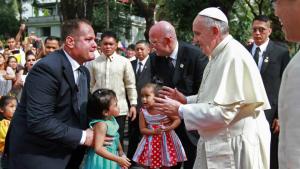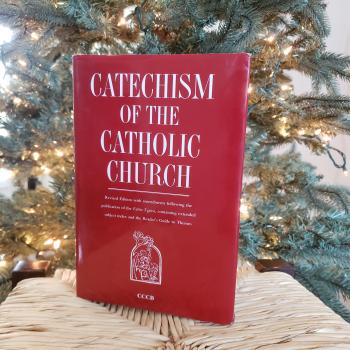
Yesterday, Pope Francis gave a message for the International Day of Persons with Disabilities. He exhorted the Christian faithful to better accept those of us who struggle with such realities. He wants us to be recognized, to be accompanied, to not be discriminated against, and to be involved as ministers, not just those ministered too.
Here is part of Pope Francis’s text. I will comment briefly after each paragraph.
We renew our gaze of faith, which sees in each brother and sister the presence of Christ Himself, Who considers every gesture of love towards one of His least brothers to have been made to Himself. On this occasion, I would like to recall how today the promotion of the right to participation plays a central role in combating discrimination and promoting the culture of encounter and quality of life.
Jesus is present in each person. So often we can forget that every single human person is made in the image and likeness of God. For many today, unfortunately, they have more trouble seeing God in the disabled.
We also need to help everyone participate in society and the Church, whatever their medical condition. This is a reminder that churches should be accessible to wheelchairs and provide services for those with other disabilities like sensory-friendly Masses.
Great progress has been made towards people with disabilities in the medical and welfare fields, but still today we see the presence of the throwaway culture, and many of them feel that they exist without belonging and without participating. All this calls not only for the rights of people with disabilities and their families to be protected, but it also exhorts us to make the world more human by removing everything that prevents them from having full citizenship, the obstacles of prejudice, and by promoting the accessibility of places and quality of life, taking into account of all the dimensions of the human being.
I think it is valuable to link the throwaway culture with disability. One aspect of this culture is reducing each person to what they can do, instead of their intrinsic human dignity. Most with disabilities struggle to do one or more things most people take for granted. Hence, the danger of the throwaway culture is to marginalize the disabled which could eventually lead to euthanasia.
It is necessary to care for and accompany persons with disabilities in every condition of life… and to make way alongside them and to “anoint” them with dignity for an active participation in the civil and ecclesial community. It is a demanding, even tiring journey, which will increasingly contribute to forming consciences capable of recognizing that each one of us is a unique and unrepeatable person.
So often we think of those with disabilities only from the perspective of ministering to them. However, all with disabilities are able to contribute to the ministry of the Church. Some may only be able to pray but most can provide something more in ministry. We need to recognize the gifts each disabled person could contribute.
Making good laws and breaking down physical barriers is important, but it is not enough, if the mentality does not change, if we do not overcome a widespread culture that continues to produce inequalities, preventing people with disabilities from actively participating in ordinary life.
This is a good point that we need to change attitudes not just laws. If attitudes change, laws will follow, but if laws change without attitude changes, they will likely be short-lived.
Go read the complete text if you want more details.
Note: Please support my online writing on Patreon; my community relies on donations.












